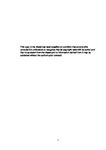Empathy: Its Significance and Monitoring in the Dietetic Consultation for Chronic Disease Management
| dc.contributor.supervisor | de Looy, Anne | |
| dc.contributor.supervisor | Farrand, Paul | |
| dc.contributor.author | Parkin, Tracey | |
| dc.contributor.other | School of Health Professions | en_US |
| dc.date.accessioned | 2012-02-01T15:30:57Z | |
| dc.date.available | 2012-02-01T15:30:57Z | |
| dc.date.issued | 2012 | |
| dc.identifier | 10137568 | en_US |
| dc.identifier.uri | http://hdl.handle.net/10026.1/908 | |
| dc.description | Full version unavailable due to 3rd party copyright restrictions. | |
| dc.description.abstract |
Communication between the patient and healthcare professional is pivotal in enabling effective self-care management to occur (Street et al., 2009) which in turn leads to improved health outcomes (Kravitz et al., 1993). However, there is little published data exploring the most effective tools for evaluating whether these communication skills occur and what particular attributes enhance the process (Goodchild, Skinner & Parkin, 2005; Heisler et al., 2003; Parkin & Skinner, 2003). This study aims to identify patient-centred communication skills occurring in consultations and to explore their link with a tool-recording agreement on reported decisions made. Quantitative analysis was conducted on 86 dietetic consultations across four outpatient diabetes services. Audio recordings from 20 of these were qualitatively analysed. Greater agreement on reported decisions correlated significantly with level of empathy demonstrated (t = .283, p = .0005). In consultations featuring agreement, dietitians expressed more empathy (p = .02), used more active listening skills, asked significantly more exploratory questions on self-care practices (U = 18.5, p = .007), provided significantly more supportive/collaborative information-giving exchanges (U = 11, p = .003) and were more likely to set an agreed agenda at the start of consultations. In contrast, consultations featuring disagreement had low levels of empathy, fewer active-listening skills and exploratory questions, significantly greater numbers of persuasive information-giving exchanges (U = 17, p = .007) and more recommending exchanges. Generally, agendas were not set. In conclusion, recording patient/healthcare professional agreement on reported decisions made during a consultation is a simple tool that can indicate the presence of patient-centred communication skills. Active-listening skills allow expressions of empathy that facilitate patient involvement and interactive dialogue. The measure of agreement should be used frequently as a marker of effective dietetic consultations and to provide further data on the relationship between patient-centred communication and implementation of behaviour change for improved health outcomes. | en_US |
| dc.language.iso | en | en_US |
| dc.publisher | University of Plymouth | en_US |
| dc.subject | Empathy | en_US |
| dc.subject | Agreement on reported decisions | en_US |
| dc.subject | Patient centred communication | en_US |
| dc.subject | Information-giving exchange | en_US |
| dc.subject | Active listening skills | en_US |
| dc.subject | Consultation skills/behaviour | en_US |
| dc.subject | Dietitian | en_US |
| dc.subject | Patient engagement | en_US |
| dc.title | Empathy: Its Significance and Monitoring in the Dietetic Consultation for Chronic Disease Management | en_US |
| dc.type | Thesis | |
| dc.identifier.doi | http://dx.doi.org/10.24382/4369 | |
| dc.identifier.doi | http://dx.doi.org/10.24382/4369 |
Files in this item
This item appears in the following Collection(s)
-
01 Research Theses Main Collection
Research Theses Main


